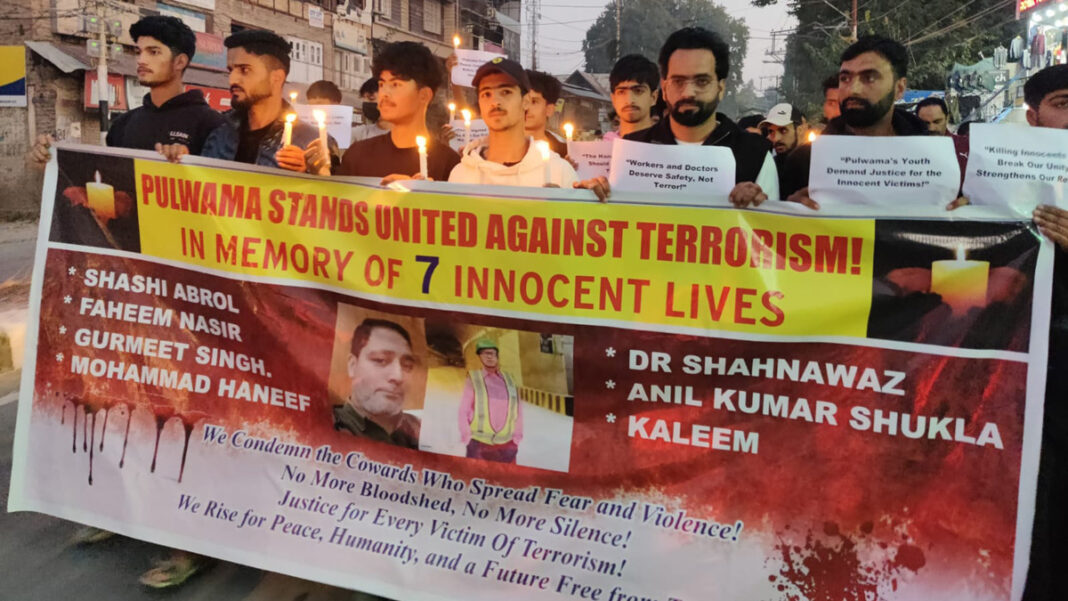On November 7, terrorists carried out another brutal attack in the Kishtwar region of Jammu and Kashmir, abducting and killing two Village Defence Guards (VDG), Nazir Ahmed and Kuldeep Kumar, from Ohli Kuntwara village. This heinous act underscores the grave threat that Kashmiris face daily from terrorism that seeks to undermine peace, stability, and the fabric of community resilience. The loss of these men, whose courage and service were dedicated to safeguarding their village, is a devastating reminder of the indiscriminate violence fuelled by external forces intent on destabilizing Kashmir.
This recent attack follows closely on the heels of the October 20 assault on the Z-Morh tunnel construction site in Gagangir, Sonamarg which claimed the lives of seven civilians, including non-local labourers and a doctor. Both incidents were claimed by The Resistance Front (TRF), an offshoot of the Pakistan-backed Lashkar-e-Taiba (LeT). These deliberate attacks on civilian lives and infrastructure highlight the lengths to which terrorist groups—and the states that sponsor them—are willing to go to obstruct progress and spread fear. Yet, the people of Kashmir stand united against this violent agenda, grounded in the values of Kashmiriyat and guided by the principles of Islam that categorically forbid the killing of innocents.
In Pulwama, I led a peaceful protest condemning the Z-Morh tunnel attack, where Kashmiris from all walks of life joined together to reject terrorism unequivocally. Such demonstrations embody our collective resolve to uphold peace and defy the narratives of fear. Our message is clear: Kashmir rejects terror in all forms, and our resilience is our response to those who seek to exploit our land. Pakistan’s actions betray not only Kashmiris but also the spirit of Islam itself, which promotes compassion and peace, not violence and hatred.
The role of Pakistan in perpetuating violence in Kashmir is blatant and shameful. Pakistan, a country mired in its own crises, has continued to export terror as a tool to destabilize Kashmir, despite the suffering it has inflicted on its own people. This strategy reveals not a commitment to any cause for Kashmiris but a desperate ploy to distract from its domestic failures. By funding and arming terror groups like TRF, Pakistan shows its disregard for both Kashmir’s peace and its own development. In clinging to this destructive agenda, Pakistan undermines the values of Islam and the welfare of Kashmiris, whom they claim to support.
The attack on the Z-Morh tunnel—part of the Zoji-La tunnel initiative to connect Sonamarg with Ladakh year-round—was not only an assault on civilians but also on Kashmir’s promise of progress. The tunnel project, vital for economic growth, mobility, and regional stability, is a symbol of the future we aspire to. Pakistan-backed groups see such projects as threats to their control; their assault on infrastructure that strengthens Kashmir’s economy and security is a testament to their destructive intentions. Pakistan-based terror groups seek to prevent Kashmir from thriving, aiming to keep it isolated and dependent on its violent proxies rather than allowing it to grow as a unified and peaceful society.
Pakistan’s intentions become all the more hypocritical when seen in the context of its domestic state. While ordinary Pakistanis face economic hardship and political disillusionment, their government invests in militancy, not development. Kashmir has seen, time and again, that Pakistan’s agenda brings nothing but devastation and loss. Our unity and resolve are the strongest message that Kashmir will not fall victim to terrorism again.
Since the abrogation of Article 370, Kashmir has been at the forefront of both tremendous change and new challenges. Terror groups like TRF have intensified attacks, especially targeting non-local workers and government officials, in an attempt to disrupt the positive developments underway. But our security forces, alongside the resilient Kashmiri people, have shown that these efforts to sow division will not succeed. Our communities remain strong, and we are committed to building a Kashmir that stands for peace, dignity, and unity.
The recent demonstrations throughout Kashmir, including those I led in Pulwama, prove that our resolve for peace will always overcome the chaos that terrorists aim to spread. As Kashmiris, we reject the false promises and empty rhetoric of Pakistan’s violent agenda. Our strength lies in unity, and we will not allow our future to be dictated by violence. Kashmir belongs to its people, and our collective vision for a peaceful, prosperous future remains unshakeable. To those who seek to destabilize our region, we say this: your violence cannot break our will. We will continue to uphold peace and reject every attempt to drag Kashmir into conflict.
As we honour the memories of Nazir Ahmed, Kuldeep Kumar, and all innocent lives lost to terrorism, we stand stronger and more united than ever. We send a message to Pakistan and its proxies that their agenda will fail, as Kashmir is defined by resilience, not fear. Kashmir’s future will be written by those who cherish life and peace—not by those who sow death and destruction.
Mudasir Dar is a social and peace activist based in South Kashmir; a Rashtrapati Award recipient in world scouting, and Zonal Head of Save Youth Save Future Foundation.
The opinions expressed in this article are those of the author and do not purport to reflect the opinions or views of THE WEEK.
theweek.in

